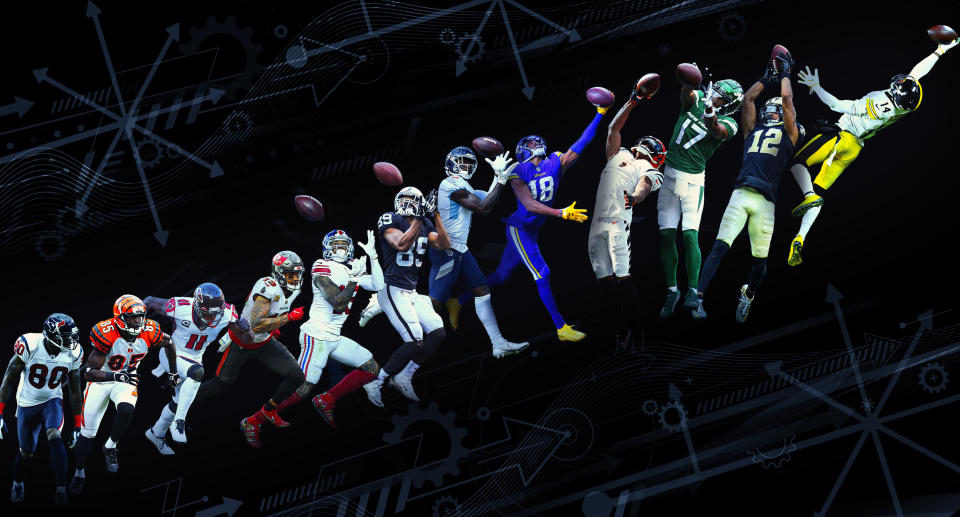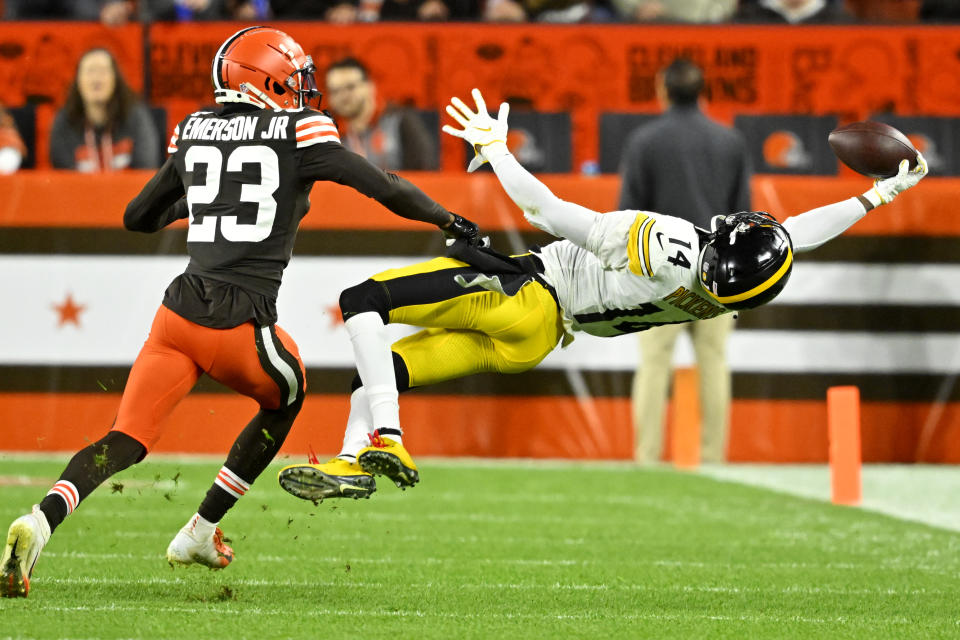Eight years ago, 13-year-old George Pickens watched Odell Beckham Jr. make one of the most incredible catches in NFL history. He saw it on television first, like the majority of football fans, and then kept watching Beckham on YouTube.
All throughout middle school and high school in Alabama, Pickens watched and learned from some of the best wide receivers in the NFL through a computer or a phone screen. He saw how OBJ ran around defenders, or how Davante Adams released off the line, or even how Tavon Austin shifted around the field. Then, he’d go out to his backyard and try to replicate it.
“I knew how to run routes myself, but I started watching YouTube just to see how guys are getting open, different jukes,” Pickens told Yahoo Sports recently. “How are these guys, you know, making these types of moves like this?”
Now that he’s a pro, Pickens all but repeated the iconic OBJ catch in Week 3 against the Cleveland Browns. He even got a shoutout from Beckham afterward on Twitter. And like Beckham’s viral reception, everyone remembered the night not for the score, but for what Pickens did.
Pickens is the quintessential wide receiver in a new age for the position. He’s a rookie, but already ascending among another crop of young wideouts. The first three receivers taken in the 2022 draft already have more than 200 receiving yards each through four games. Pickens, a second-rounder, has 167 yards. Fourth-rounder Romeo Doubs has 184. Jahan Dotson, the fifth wideout taken in the first round, has four touchdowns.
Now more than ever, receivers are demonstrating their value quickly in their first or second seasons. It doesn’t take 3-5 years for a receiver to evolve into a star anymore.
Justin Jefferson and Ja’Marr Chase broke Anquan Boldin’s 17-year-old rookie single-season receiving yards record in back-to-back years in 2020 and 2021. This past season, 12 wideouts under the age of 26 hit 1,000 receiving yards — the most in NFL history.
It’s even harder to miss with a first-round receiver recently, too. Only three of the 15 receivers taken in the first round since 2018 — N’Keal Harry, Jalen Reagor and Henry Ruggs — have yet to post an 800-yard season in at least 13 games. Seven of those 15 have already eclipsed 1,000 yards in a season.
The reasoning can be boiled down to two trends in football and a specific development in technology.


Pro-style and pass-heavy offenses have quickly gained steam over the past 20 years at all levels of football, which in turn makes the receiver position inherently more valuable to a team and therefore more financially beneficial for a player. Also, the social media age created a world in which players can watch, rewatch and break down film from anywhere and on any device.
The dream, so to speak, has never been closer for many aspiring players.
Football’s passing boom has permeated all levels
It’s impossible to look back at the past two decades and not see the rise of the passing game in the NFL. Attempts are up 9.4 percent during the 16-game schedule from 2000-2019 and hit 18,712 in the first season with 17 games in 2021. Passing touchdowns increased by 25.7 percent during that span as well and hit a high of 871 in the 2020 season.
This isn’t just a team trend. The advent of the passing game signaled the shift from relying on running backs to receivers as well. There were 23 1,000-yard rushers in 2000 compared to 17 1,000-yard receivers. By 2011, there were 15 running backs to 17 wideouts to hit that mark, and the two positions continued to diverge until 2021, when there were 23 receivers to eclipse the mark and just seven running backs.
The growth of spread offenses at every level of football played a big role in teams leaning on pass-catchers. With an influence from the college ranks, high school coaches began adopting more pass-heavy 11- or 10-personnel groupings (four wideouts with just one running back and/or no tight ends) to fuel their offenses over the past decade. Players began going to more 7-on-7 camps as well which fed into the pass-heavy practice approach. This eventually led to players being exposed to more pro-style schemes much earlier in their development.
For example, Cincinnati Bengals star Ja’Marr Chase learned how to play in a spread offense during his sophomore year in 2016 at Rummell High School in Metairie, Louisiana. Head coach Jay Roth switched from a run-oriented offense to a scheme similar to the one Mike Norvell ran at the University of Memphis at the time, with no-huddle, up-tempo plays incorporating a wide range of routes for pass-catchers.
“He had access to learning about an offense similar to what he might run in college or the next level,” Roth told Yahoo Sports.
The same can be said for New York Jets rookie Garrett Wilson, who joined the Lake Travis High School varsity team as a sophomore in 2017 after switching from quarterback to wideout. Lake Travis and other schools in Texas had quickly shifted to the pro-style offense over the past 20 years, which head coach Hank Carter says gave Wilson a leg up when he went to Ohio State a few years later.
“Coming out of high school, [Wilson] had a pretty decent foundation just for understanding how to control his body, running routes and all those things,” Carter said. “Garrett has been able to come in and adjust pretty quickly.”
Rule changes helped receivers a lot, too. Defensive backs can’t touch receivers more than 5 yards away from the line of scrimmage (something the NFL recently asked officials to pay more attention to this year) and defensive holding or pass interference penalties are much more prevalent. This has given receivers more freedom to move about the field and make plays in space.
Smaller pass-catchers became more important as a result, too. It’s no longer a prerequisite to be at least 6 feet tall and more than 200 pounds to be a top-flight NFL receiver. From 2000-2010, there were 38 total 1,000-yard receivers under 6 feet. From 2011-2021, there were 62.
“It doesn’t matter if you 5-5 or 6-5 if you know how to begin to create separation from the release to top of the break, you know how to get open, know how to run routes and catch,” Texas-based trainer Delfonte Diamond said. “If I was an NFL coach, I wouldn’t care about height.”
Diamond, who has trained Dallas Cowboys wideout CeeDee Lamb since Lamb was 14, noticed the change of more prolific pass-catchers around 2011 as well. It wasn’t random, either. That year also featured the accidental release of YouTube video that another receiver trainer, Tevin Allen, says ignited the revolution.
Social media’s rise offered receivers a new kind of tutelage
Allen is a South Florida-based trainer known as Gold Feet. He says he has trained more than 200 NFL wideouts, and remembers the social media video well. It was posted to YouTube during the 2011 NFL lockout and featured receiver greats like Chad Johnson, Andre Johnson and Santana Moss practicing with South Florida trainer Bo Smith.
The 6-minute, 40-second clip showed the wideouts, including a then-22-year-old Antonio Brown, going through the nuances of route-running, hand placement and footwork fundamentals — effectively the secret formula to cracking the receiving code.
Up until that point, training was a closed world for young players looking to make it to the next stage unless they had connections or money, which neither Allen nor his friends had growing up, he said. The videos athletes posted wouldn’t give away much, either, except for maybe how much weight they lift or how many hill sprints they run.
But when he and his friends watched the video, Allen saw for the first time how to build their future.
“No one was really showcasing on Instagram for everyone to see what they actually did behind the scenes,” Allen told Yahoo Sports. “So as soon as that happened, it was kind of free game.”


That video helped usher in a wave of trainers posting videos of their clientele on social media. Everything blew up further when Instagram added videos to its platform in 2013. Kids weren’t just following their favorite stars, they followed their favorite stars’ trainers. They watched and learned how the best football players in the world worked out and honed their craft. Right in the palm of their hands.
That exposure, coupled with the rise of pro-style offenses at a high school level, helped breed a new level of confidence and excitement among players who wanted to become NFL stars.
That original video was never suppose to see the light of day. Bo Turner, who was the trainer in the video, didn’t want to give away his regimens and workout plans. Turner has helped train NFL players at various positions, including Chad Johnson, Devonta Freeman and Adam Thielen.
“We never filmed that stuff because it’s very, very vital information for any person that goes through these things,” Turner said. “If you can master these things, no one gonna be able to stop you at what you do.
“It was a closed world 10 years ago. Now the world is completely open.”
‘They go to the game for the 60-yard touchdown pass’
The wide receiver boom doesn’t seem to be slowing down. Just look at the money teams have spent on pass-catchers over the past few years. The value of a receiver has never been higher, and young players are buying into the hype.
Longtime receivers coach Jerry Sullivan has watched it all unfold over his 40 years at the college and NFL levels. He has worked with players from Boldin and Larry Fitzgerald to Jefferson.
“What’s more exciting watching: a 70-yard drive when they’re running the ball at 10-yard or 5-yard intervals and scoring, or watching a guy catch a 60-yard touchdown pass?” Sullivan asked. “Well, they go to the game for the 60-yard touchdown pass. It’s like how a car in 2022 doesn’t look like a car in 2001. It changes with people’s tastes and people’s taste now is speed and excitement.”
And with all that action packed into a video on a phone, it’s never been easier to turn backyard practice routes into a Thursday night NFL highlight catch. Just like what Pickens did a few weeks ago.
“Think about this: It ain’t the first time [Pickens] saw that catch,” Sullivan said. “I bet he looked at that old Odell Beckham catch probably a thousand times. And then knew how to do it. And when the time came, it worked out.”
